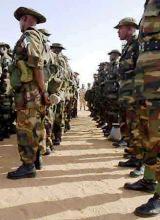AU says to deploy full Darfur mission by year end
By Opheera McDoom
KHARTOUM, Dec 4 (Reuters) – African forces should be fully deployed to Sudan’s troubled Darfur region by the end of the year despite some delays in building the infrastructure to house them, the new head of the African Union mission said on Saturday.

|
|
Nigerian soldiers arrive in El-Fasher in Western Sudan, October 28, 2004. |
On his arrival in Sudan, mission chief Baba Gana Kingibe said that a joint declaration of principles should be signed within the first two weeks of Darfur peace talks, due to reconvene in the Nigerian capital Abuja around Dec. 10.
“We expect that before long within a week or two the declaration of principles which was negotiated and largely agreed upon will be finalized and signed,” Kingibe, a former Nigerian foreign minister, told reporters in Khartoum.
“We believe that early in the new year we will be making a robust approach toward inching to a final peace deal.”
The United Nations has threatened Sudan with possible sanctions if it fails to stop the violence in Darfur, which it says has created one of the world’s worst humanitarian crises.
More than 1.6 million people have been driven from their homes into makeshift camps. The United States says the violence is genocide, a charge Khartoum denies.
The African Union has been slowly increasing its force in remote Darfur toward a 3,300-strong contingent with a stronger mandate which includes monitoring a shaky April cease-fire, monitoring Sudanese police and limited powers to protect civilians, but Kingibe said the slow progress was not because of lack of funding or difficulties in finding suitable troops.
“It is better that we synchronize the deployment of the troops to the availability of facilities on the ground. We are working on how we can speed up the provision of infrastructure on the ground to the deployment of the troops,” he said.
“I think that by Dec. 15 we should have quite a number of troops in. By the end of December we should have all the complements of the troops on the ground,” he said.
After years of skirmishes between Arab nomads and mostly non-Arab farmers over scarce resources in arid Darfur, rebels took up arms early last year accusing Khartoum of neglect and of arming Arab militias, known as Janjaweed, to loot and burn non-Arab villages.
Khartoum admits arming some militias to fight the rebels but denies any link to the Janjaweed, calling them outlaws.
Kingibe, who was the African Union’s special envoy to south Sudan, where a separate and bloodier civil war has raged for more than two decades, said a peace deal for the south would help solve the Darfur conflict when the southern rebel group, the Sudan People’s Liberation Movement, joins the post-peace central government in Khartoum.
“A deal in the south will also involve the participation of the SPLM in the government of national unity in Khartoum and I am sure that they will make their contributions to perhaps approaching more creatively the solutions to the other problems facing the country,” he said.
